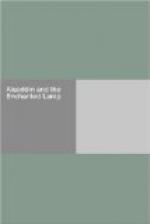[FN#609] Lit. “proceeded from her in truth.”
[FN#610] Tih, lit. pride, haughtiness, but, by analogy, “coquetry.”
[FN#611] Lit. “Gaiety, ecstasy or intoxication (keif) whirled (dara) in his head.”
[FN#612] Lit. “not itself exactly with him” (ma hiya bi-eimhi indahu.)
[FN#613] Lit. “turned over” (kelebet, a clerical error for kebbelel).
[FN#614] Tekeddemet lihi wa basethu fi kheddihi. Burton, “again she kissed its lip and offered it to him.”
[FN#615] Terakedsou, lit. raced with one another.
[FN#616] Babu ’sz szeray.
[FN#617] Night DLXXXIV.
[FN#618] Keszr.
[FN#619] Lit. “in” (fi); but fi is evidently used here in mistake for bi, the two prepositions being practically interchangeable in modern Arabic of the style of our present text.
[FN#620] Burton, “his costliest raiment.”
[FN#621] Or chamber (keszr).
[FN#622] Night DLXXXV.
[FN#623] Sic (raihh), a common vulgarism in this text.
[FN#624] Night DLXXXVI.
[FN#625] Lit. “also” (eidsan).
[FN#626] i.e. the two were as like as two halves of a bean.
[FN#627] i.e. the world.
[FN#628] Or death (Saturn), the eighth division of the common astrological figure.
[FN#629] Menkeleh. See my Book of the Thousand Nights and One Night, Vol. I. p. 129, note 1. {see Vol. 1 of Payne’s Book of the Thousand Nights and One Night, FN#41}
[FN#630] Dsameh.
[FN#631] Liha keramat kethireh. Kerameh (sing. of keramat), properly a favour or mark of grace, a supernatural gift bestowed by God upon His pious servants, by virtue whereof they perform miracles, which latter are also by derivation called keramat. Cf. Acts viii. 28: “Thou hast thought that the gift of God,” i.e. the power of performing miracles, “may be purchased with money.”
[FN#632] Night DLXXXVII.
[FN#633] Weliyeh.
[FN#634] Fe-ain (where), probably a mistranscription for fe-men (who).
[FN#635] Sitti, fem. of Sidi, “my lord,” the common title of a saint among modern Arabic-speaking peoples.
[FN#635] Meskin, lit. “poor wretch,” but used as our “good man” and the French “bonhomme,” in a sense of somewhat contemptuous familiarity.
[FN#636] Lit. “wished the man increase of his good (istekthera bi-kheirihi, for which idiomatic expression= “he thanked him,” see ante, p. 135, note 3 {see FN#383}), and thanked his excellence” (favour or kindness, fedsl).
[FN#637] Sherabati. Burton, “vintner.”
[FN#638] Keniz, a word which I cannot find in any dictionary, but which appears to be the past participle (in the secondary form for mecnouz, as ketil, slain, for mertoul,) of keneza, a lost verb of which only the fourth form acneza, he drank from a cup (kinz), survives, and to mean “something drunk from a cup.” Burton, “wine.”




